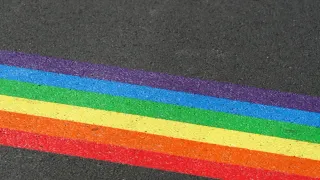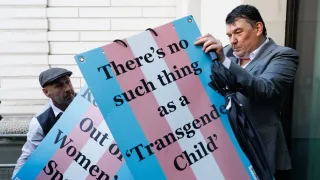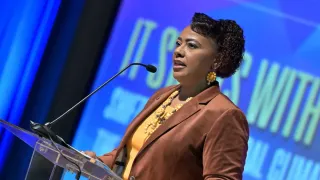
4 hours ago
Anthony Bowens Credits Fellow LGBTQ+ Stars for Empowering Him to Be Himself in AEW
READ TIME: 14 MIN.
Professional wrestling has long been viewed as a macho spectacle, but in recent years, the sport has transformed into a more inclusive space where LGBTQ+ athletes are increasingly visible. Among those leading this change is Anthony Bowens, an All Elite Wrestling (AEW) star who has become one of the most prominent openly gay wrestlers in the industry. Bowens' recent reflections on his journey highlight the importance of representation, community, and acceptance within professional sports.
Bowens first came out publicly in wrestling in 2023, taking to the ring in an emotionally charged moment that resonated with audiences around the world. During a live AEW event, Bowens declared his truth in front of thousands, alongside fellow wrestler Harley Cameron, sparking a resounding crowd chant of “he’s gay” that quickly went viral online. The significance of this moment was not lost on Bowens, who later described it as a historic first: “I think that was the first time in history anybody’s ever said, ‘I’m gay’ in a wrestling ring on television,” Bowens told PinkNews. He admitted to feeling apprehensive before making the announcement, unsure of how the crowd would react. “I wasn’t sure what the response would be, expected a couple claps didn’t think it would be too negative… have an entire arena standing up, going nuts and chanting ‘he’s gay’ was incredible. It was a fun thing to do. Everyone in the building was enjoying it and it’s a moment people still bring up” .
Bowens’ decision to come out was influenced heavily by the visible presence and confidence of other LGBTQ+ wrestlers within AEW. In a recent interview with Jimmy V3, Bowens reflected on his early days with the promotion, describing how seeing colleagues like Sonny Kiss and Nyla Rose live authentically and without fear inspired him to do the same. “One of the contributing factors to coming here in the first place was when I was first an extra here. I just noticed people like Sonny Kiss and Nyla Rose walking around not worrying about anything, judgment-free, and being able to live their lives normally like everything should be. So, it’s a great environment to work in,” Bowens explained .
Kiss, who is openly gay and uses both he and she pronouns, and Rose, the first openly transgender wrestler to sign with a major American promoter and win a top championship, have each paved the way for greater inclusion and acceptance in the wrestling world. Their visibility within AEW helped normalize queer identities within the sport and demonstrated to Bowens and others that authenticity would be met with respect and camaraderie .
Bowens has repeatedly emphasized the positive impact that AEW’s culture of acceptance has had on his personal and professional life. “It’s been great working at AEW because I always feel free to be myself. It was never a worry,” he said. “I didn’t have much representation when I was growing up watching wrestling. I mean, there was maybe one, two, if that. But it’s really cool to be able to live my dream and also have people relate to your story and have people relate to your journey and know that you’re impacting folks positively just by living your dream” .
The normalization of LGBTQ+ identities in AEW stands in stark contrast to the industry’s past, when queer wrestlers often had to keep their identities hidden due to fear of discrimination or backlash. Bowens’ experience as an out gay man in AEW marks a significant cultural shift, signaling that the company’s commitment to diversity and inclusion is not merely symbolic but actively lived out in its roster and ethos .
Since coming out, Bowens has used his platform to advocate for LGBTQ+ rights and visibility both within and outside the wrestling ring. In June 2025, he served as a Grand Marshal at the Dallas Pride Parade, a role that underscored his commitment to representation and community engagement . Bowens has also been recognized for inspiring younger generations of fans who might not have seen themselves reflected in professional wrestling before.
Bowens’ advocacy is rooted in a desire to ensure that the next generation of queer athletes and fans feel seen and celebrated. “To be able to represent the LGBTQ+ community every week because I felt like I didn’t have much representation when I was growing up watching wrestling. I mean, there was maybe one, two, if that, but it’s really cool to be able to live my dream and also have people relate to your story,” he reflected .
Bowens’ journey is part of a larger movement toward greater acceptance and inclusion in sports, with wrestling serving as a microcosm for broader social change. The visibility of LGBTQ+ wrestlers in AEW has challenged stereotypes, encouraged dialogue, and opened doors for more athletes to come out and compete without fear of stigma. By living authentically and supporting one another, Bowens, Kiss, Rose, and others have demonstrated the transformative power of community and representation in changing the culture of professional wrestling.
As AEW continues to spotlight diverse talent, Bowens’ story serves as a beacon of hope for LGBTQ+ fans and aspiring athletes. His candidness about the challenges and triumphs of coming out in a traditionally conservative industry has resonated far beyond wrestling, reinforcing the message that authenticity is powerful and that supportive communities can help individuals thrive. For Bowens, the journey is ongoing, but his impact—inside and outside the ring—is already clear.






